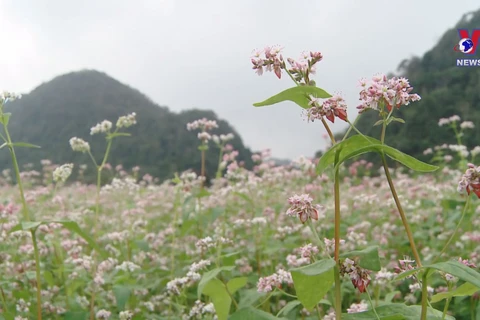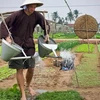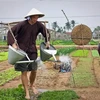 “Shan tuyet” tea, a famous specialty of Phin Ho village, is one of the special things visitors cannot forget once setting foot in Tay Con Linh Mountain in the northernmost province of Ha Giang. (Photo: VNA)
“Shan tuyet” tea, a famous specialty of Phin Ho village, is one of the special things visitors cannot forget once setting foot in Tay Con Linh Mountain in the northernmost province of Ha Giang. (Photo: VNA) Hanoi (VNA) – Apart from stilt houses and seemingly endless terraced paddy fields, “shan tuyet” tea, a famous specialty of Phin Ho village, is one of the special things visitors cannot forget once setting foot in Tay Con Linh Mountain in the northernmost province of Ha Giang.
Phin Ho is a mountainous village in the most remote area of Thong Nguyen commune, next to Tay Con Linh Mountain, which is more than 35 kilometres from the centre of Hoang Su Phu district. Located at an altitude of 1,500 - 2,000 metres, it boasts a cool climate all year round with an average temperature of 14 - 22 degrees Celsius, much rain, humidity of over 80 percent, and frequent fog, which are favourable for growing herbal and “shan tuyet” tea plants.
Dao ethnic minority people harvest the Phin Ho tea mainly from natural trees, many of which grow on high mountains surrounded with fog, even ice and snow, for hundreds of years, giving them strong vitality. Also thanks to that cool and fresh environment, the “shan tuyet” tea in Hoang Su Phi district, including in Phin Ho, is famous for its pure and delicious taste.
The tea has big leaves that are 3 - 6 centimetres long, buds and young leaves covered with soft fur as white as snow. The Phin Ho “shan tuyet” tea boasts distinctive aroma, a moreish flavour, and green water colour while its sweetness still linger after the drinker takes a sip of the beverage.
The old tea trees that grow at an altitude of over 1,000 metres and constantly produce new leaves and buds are the main source of income for residents in surrounding communes.
In the past, due to old-fashioned farming and processing techniques, their tea was sold at only 5,000 - 6,000 VND (over 0.2 USD at the current exchange rate) per kg of fresh tea buds, leading to a modest production value of 10 million - 12 million VND per hectare each year.
Over the last 10 years, authorities of Hoang Su Phi district have paid attention to tea development. The Dao ethnic people in Phin Ho village have worked together to set up a tea cooperative and gradually make their tea specialty known far and wide.
The local administration has organised annual training courses to equip farmers with tea cultivating, caring, harvesting, and processing techniques under organic standards, involving more than 2,700 households.
Authorities have coordinated with the farmers’ union to establish and maintain groups of tea farmers in Nam Ty, Tung San, Ho Thau, and San Sa Ho communes. These groups have also received training in farming and harvesting techniques thanks to support from the tea cooperative.
Since 2016, a number of policies have been issued by the district’s administration to promote tea cultivation, upgrade equipment for the Phin Ho tea processing cooperative and the Hoang Su Phi agricultural and forestry product processing cooperative, and develop packages and labels for the tea products rated three stars and higher under the One Commune, One Product (OCOP) programme.
The district is currently home to 4,654ha of tea farming land, 3,589ha of which is harvestable, generating 14,000 tonnes of fresh buds annually.
There are eight tea production and processing cooperatives in the district, with a capacity of at least 3 - 5 tonnes per day. Besides, there are 20 large-scale processing facilities and 300 smaller ones owned by local households. They have also paid attention to label and trademark registration to advertise and boost the sale of their products.
At present, each hectare of tea creates an income of about 35 million VND, rising more than three-fold from 10 years ago, helping to lift all tea farming households in Phin Ho out of poverty. Meanwhile, workers of the Phin Ho tea processing cooperative earn a monthly per capita income of 5 - 15 million VND, five times higher than the time this cooperative was just established.
Two products of the cooperative obtained the national five-star rating in the OCOP programme in 2020.
Achieving the OCOP certificates and the 2020 National Quality Award will create a chance for the cooperative to further improve its management by applying the best production and business practices, helping enhance its competitiveness amid the country’s regional and international integration process./.























